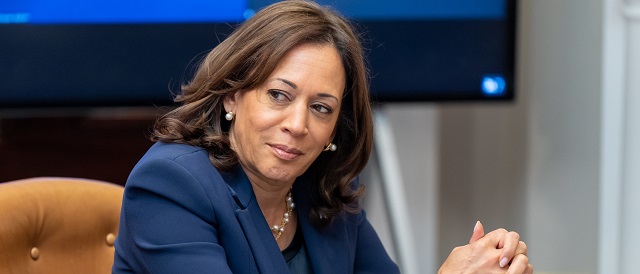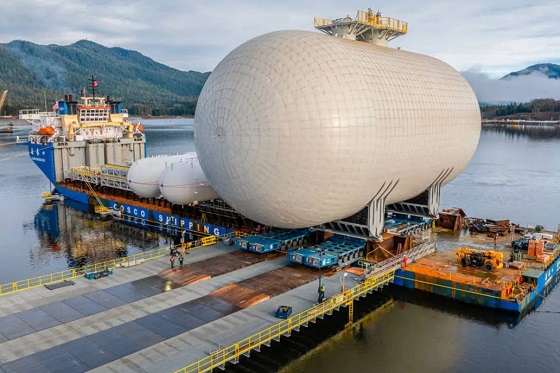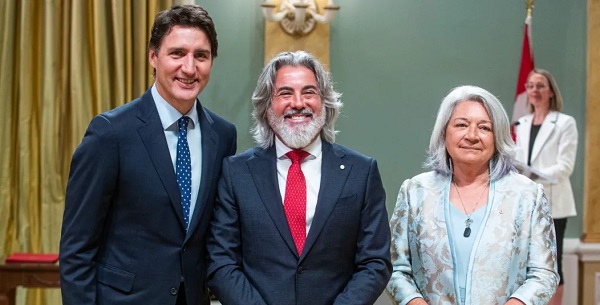Energy
Opinion: A Kamala Harris Presidency Is The Stuff Of Nightmares

 From the Daily Caller News Foundation
From the Daily Caller News Foundation
By PETER MURPHY
Vice President Kamala Harris is one election away from winning the White House and accelerating America’s climate hysteria that is already well underway thanks to the outgoing President Joe Biden.
“There is no question I’m in favor of banning fracking,” then-Sen. Harris said during a CNN-sponsored town hall back in 2019, during her ill-fated run for president.
That same year, she threw her support behind the Green New Deal, proposed by New York Democratic Rep. Alexandria Ocasio-Cortez and Massachusetts Democratic Sen. Ed Markey. That is a plan that would spend trillions of taxpayer dollars to “transition” America from oil, gas and coal sources to so-called wind, solar and batteries–or, rather, to subjugate the nation to an all-powerful green state under the command of the federal government.
Harris later teamed with AOC to introduce the Climate Equity Act, which was a confusing, word-salad of a bill to address climate “injustice” in “front-line communities” using the familiar means of creating a massive new federal bureaucracy.
During Harris’ short-lived campaign for president, which crashed and burned months before the 2020 caucus and primary votes, she called for a climate pollution fee that would “make polluters pay for emitting greenhouse gases into our atmosphere.” Typical of so many climate falsehoods, Harris conflates carbon emissions with “pollution.”
In his letter to the nation last Sunday announcing he was dropping out of the presidential race, President Joe Biden boasted that he had overseen passage of the “most significant climate legislation in the history of the world” — an apparent reference to his misnamed Inflation Reduction Act. This “significant” legislation included hundreds of millions of dollars of corporate welfare for companies to build wind turbines, solar panels and electric vehicles and other climate-related projects.
Because, after all, the U.S. is “the world’s largest historical contributor to climate change – still the second largest today after China’ said a story posted by the climate-rabid media outlet, Yahoo News. Expect a President Harris to double down on such unscientific drivel.
In a modern historical anomaly, Harris is poised to become a major party’s presidential nominee without a single caucus or primary vote, which is a throwback to the old days of party bosses and smoke-filled rooms at convention time.
Still, Harris is among the most privileged Americans to ever become a presidential nominee of a major political party, though not without difficulties. Her parents were both college professors, but they divorced when she was young. Following law school, Harris became a prosecutor in the Alameda County attorney’s office. With the assistance of her politically powerful mentor and very close friend, the charismatic California State Assembly Speaker Willie Brown, she was appointed to several public jobs, elected as San Francisco district attorney, attorney general of California, and then U.S. senator.
After becoming a senator, Harris began running for president. Her 2020 presidential campaign helped reveal her radical positions on climate and a host of other issues and enabled her to get on the short list of vice presidential choices.
With Biden’s mental and physical decline now so obvious, Harris has become the beneficiary of a ninth-inning political coup d’état against the president, engineered by Democratic Party leaders, who pressured him to drop his re-election campaign on the eve of the party’s nominating convention.
Harris is no Scranton-born, working-class pretender, who rode Amtrak. She does not have any record of political centrism, moderation or bipartisanship, which Biden practiced off and on throughout his career and helped him win the presidency in 2020.
By contrast, Harris is a product of the one-party state of California, who supported destructive policies on climate change, energy, crime and welfare that helped spark in California high fuel costs, declining living standards and a population exodus.
The election of 2024 will have climate change on the ballot, as did the 2020 election. The big difference this time is that Americans have experienced more than ever the inflationary and detrimental effects of climate policies with no impact on climate change.
And, it is not a supposed moderate candidate making the climate sale to the public, but a true believer, Kamala Harris.
Peter Murphy is Senior Fellow at the Committee For A Constructive Tomorrow (CFACT), a Washington D.C.-based organization in support of free market, technological solutions to energy and environmental challenges.
Alberta
Emissions Reduction Alberta offering financial boost for the next transformative drilling idea

From the Canadian Energy Centre
$35-million Alberta challenge targets next-gen drilling opportunities
‘All transformative ideas are really eligible’
Forget the old image of a straight vertical oil and gas well.
In Western Canada, engineers now steer wells for kilometres underground with remarkable precision, tapping vast energy resources from a single spot on the surface.
The sector is continually evolving as operators pursue next-generation drilling technologies that lower costs while opening new opportunities and reducing environmental impacts.
But many promising innovations never reach the market because of high development costs and limited opportunities for real-world testing, according to Emissions Reduction Alberta (ERA).
That’s why ERA is launching the Drilling Technology Challenge, which will invest up to $35 million to advance new drilling and subsurface technologies.
“The focus isn’t just on drilling, it’s about building our future economy, helping reduce emissions, creating new industries and making sure we remain a responsible leader in energy development for decades to come,” said ERA CEO Justin Riemer.
And it’s not just about oil and gas. ERA says emerging technologies can unlock new resource opportunities such as geothermal energy, deep geological CO₂ storage and critical minerals extraction.
“Alberta’s wealth comes from our natural resources, most of which are extracted through drilling and other subsurface technologies,” said Gurpreet Lail, CEO of Enserva, which represents energy service companies.
ERA funding for the challenge will range from $250,000 to $8 million per project.
Eligible technologies include advanced drilling systems, downhole tools and sensors; AI-enabled automation and optimization; low-impact rigs and fluids; geothermal and critical mineral drilling applications; and supporting infrastructure like mobile labs and simulation platforms.
“All transformative ideas are really eligible for this call,” Riemer said, noting that AI-based technologies are likely to play a growing role.
“I think what we’re seeing is that the wells of the future are going to be guided by smart sensors and real-time data. You’re going to have a lot of AI-driven controls that help operators make instant decisions and avoid problems.”
Applications for the Drilling Technology Challenge close January 29, 2026.
Energy
Canadians will soon be versed in massive West Coast LPG mega-project

Welcome to the world of REEF
Most Canadians, know who Connor McDavid is.
Most Canadians, know who Connor Bedard is.
And, well … most Canadians know who Howie Mandel is, right?
Household words.
But do any Canadians, know what REEF is? Probably not.
The Ridley Island Energy Export Facility project, a large-scale terminal near Prince Rupert, B.C., being built by AltaGas to export liquefied petroleum gas (LPG) and other bulk liquids to global markets.
Did you know it is providing valuable propane to Japan? No, not for barbecues, but for crucial energy demands in the Asian nation.
Japan uses propane (LP gas) for a wide range of purposes, including household use for cooking, water heating, and room heating, as well as for a majority of taxis, industrial applications, and as a raw material for town gas production.
Construction is progressing, with a target startup around the end of 2026. The project involves building significant infrastructure, including large storage tanks.
And it just so happens that Resource Works CEO Stewart Muir, paid a visit this past week to get a close-up look at a part of Canada’s export story that almost nobody talks about: a brand-new accumulator tank built to hold chilled propane and butane.
“It’s the largest of its kind anywhere. Two more are on the way, and together they’ll form a critical piece of the AltaGas Ltd. REEF project,” Muir said in a report.
”What stood out to me is the larger pattern: projects like this only happen because of the crown jewel of the B.C. economy — the Montney Formation.”
“It’s the triple-word-score of Canadian resource development: LNG, valuable natural gas liquids like propane, and the diluent streams that help unlock Canada’s single biggest export category, crude oil.”
Like the oilsands, the industry has long known about the Montney formation, which stretches 130,000 square kilometres in a football-shaped diagonal from northeast British Columbia into northwest Alberta.
According to CBC News, underneath this huge tract of land, the National Energy Board (NEB) estimates there’s 90 billion barrels of oil equivalent (boe), most of it natural gas. That’s more than half the size of the oilsands, yet the Montney has received only a fraction of the attention, at least from the public at large.
For oil and gas types, the gold rush is on.
Without question, and despite the ire of green groups who seem to be against any kind of resource development in Canada, the Montney is the quiet force multiplier behind local jobs, municipal tax bases, and the national balance of trade.
And it’s all being done at the highest environmental standard, with producers like Tourmaline Oil Corp already posting a 41% reduction in CO2 emission intensity and a target of 55% less methane emission intensity.
”Congrats to AltaGas for pushing this project forward, and a nod as well to other major employers on the North Coast — Trigon, CN and Pembina, writes Muir.
“Quietly and steadily, they’re building the future prosperity of Canadians. And thanks to Mayor Herb Pond, who took the time to walk us through the regional dynamics that make this corridor such a strategic asset.”
Muir was gobsmacked by the size of the project.
Sources say Alberta’s midstream bottleneck and rapid growth of Shale oil and gas exploration and production, has created an absolute glut in ethane, propane and butane. Ridley Island takes this glut and transports it to the Prince Rupert region by railcar and exports to Asian markets.
Ridley Island’s current export capacity of 92,000 bpd is undergoing aggressive expansion to growth by another 115,000 bpd over the next few years in two more phases of construction.
Recent images detail active construction efforts of the storage, jetty and rail infrastructure.
Alas, every issue that threatens to derail the ambitions of Canada’s oil and gas industry — access to market, First Nations land rights, public acceptance of infrastructure projects and, especially, the climate consequences of burning fossil fuels — is writ large in the Montney.
There are now seven separate lawsuits, and threats of further escalation, centred on claims by the Lax Kw’alaams and Metlakatla First Nations (collectively the Coast Tsimshian) that they were misled and lied to by the Crown when they agreed to developments on their traditional lands at Prince Rupert, John Ivison at the National Post reported.
The dispute over a future propane export facility at the port has spread to other resource projects, and the two First Nations have launched lawsuits against the Ksi Lisims LNG project that was one of the Liberal government’s major projects announced by the prime minister last week.
Further, the conflict threatens to negatively impact any plans Ottawa and the province of Alberta have to build an oil pipeline to the port.
Prime Minister Mark Carney’s recent announcements giving the green light to Alberta’s oil & gas industry has stirred the energy pot to new levels.
B.C. Premier David Eby — who prides himself on Indigenous virtue signalling — is pissed off. It appears he was largely left out of the loop and he is digging in.
Eby said the B.C. government needs to make sure this pipeline project doesn’t become an “energy vampire.”
“With all of the variables that have yet to be fulfilled — no proponent, no route, no money, no First Nations support — that it cannot draw limited federal resources, limited Indigenous governance resources, limited provincial resources away from the real projects that will employ people,” Eby added.
B.C.’s Coastal First Nations also say they will use “every tool in their toolbox” to keep oil tankers out of the northern coastal waters.
It is now apparent that all roads, or, shall we say, pipelines, lead to Prince Rupert.
The feds now face an imposing uphill battle, to leverage their standing as a regulator and resolve a dispute that threatens Canada’s crucial growth agenda.
— with files from CBC News, National Post
THE MAKICHUK REPORT is free today.
But if you enjoyed this post, you can tell THE MAKICHUK REPORT that their writing is valuable by pledging a future subscription.
You won’t be charged unless they enable payments.
-

 Agriculture2 days ago
Agriculture2 days agoHealth Canada pauses plan to sell unlabeled cloned meat
-

 Artificial Intelligence1 day ago
Artificial Intelligence1 day agoGoogle denies scanning users’ email and attachments with its AI software
-

 Health1 day ago
Health1 day agoOrgan donation industry’s redefinitions of death threaten living people
-

 National2 days ago
National2 days agoAlleged Liberal vote-buying scandal lays bare election vulnerabilities Canada refuses to fix
-

 COVID-191 day ago
COVID-191 day agoFDA says COVID shots ‘killed’ at least 10 children, promises new vaccine safeguards
-

 Alberta1 day ago
Alberta1 day agoNet Zero goal is a fundamental flaw in the Ottawa-Alberta MOU
-

 Addictions2 days ago
Addictions2 days agoThe Death We Manage, the Life We Forget
-

 Addictions1 day ago
Addictions1 day agoManitoba Is Doubling Down On A Failed Drug Policy









